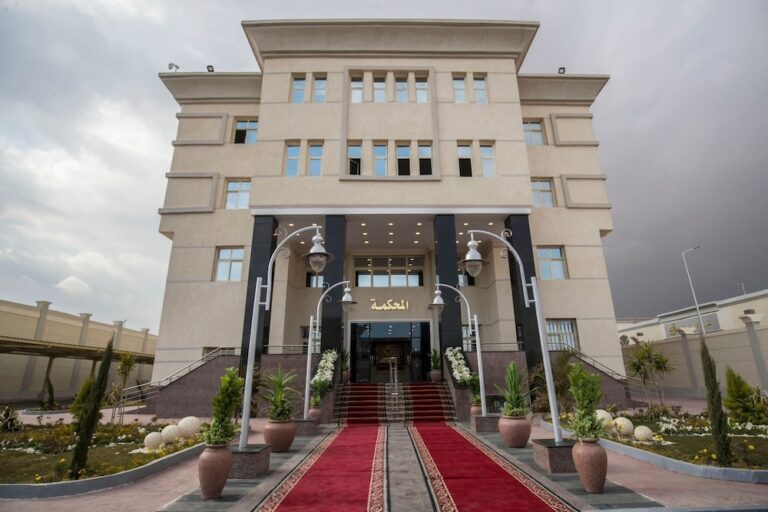(HRW/IFEX) – The following is a 14 February 2003 Human Rights Watch press release: Egypt: Growing Numbers of Arrests Emergency Legislation Used to Suppress Free Expression (New York, February 14, 2003) – Recent arrests of demonstrators in Egypt may signal increasing repression of public dissent, Human Rights Watch said today. In recent weeks, state security […]
(HRW/IFEX) – The following is a 14 February 2003 Human Rights Watch press release:
Egypt: Growing Numbers of Arrests
Emergency Legislation Used to Suppress Free Expression
(New York, February 14, 2003) – Recent arrests of demonstrators in Egypt may signal increasing repression of public dissent, Human Rights Watch said today.
In recent weeks, state security forces have used Egypt’s state of emergency law to administratively detain individuals who took part in peaceful demonstrations expressing opposition to a possible war in Iraq or support for the Palestinian uprising. Activists have expressed strong fears that others have been specifically targeted for arrest in the coming days to prevent them from participating in an upcoming demonstration planned for February 15, 2003.
“Egyptian citizens have every right to peacefully express their opposition to war in Iraq, or to anything else,” said Hanny Megally, executive director of the Middle East and North Africa division of Human Rights Watch. “The right to free expression is enshrined in international law and the Egyptian constitution.”
Megally said the arrests raised serious concerns about the use of Egypt’s emergency legislation to crack down on basic freedoms. He urged the Egyptian government not to ban peaceful demonstrations, as it has done in response to crises in the past.
Human Rights Watch called on the Egyptian government to either charge those arrested with recognizable criminal offenses and bring them promptly before a civilian court, or to release them immediately.
At 3:00 o’clock in the morning of February 8, 2003, plainclothes officers, apparently from Egypt’s State Security Intelligence (SSI – Mabahith Amn al-Dawla), raided the home of Ibrahim al-Sahary, an Egyptian journalist writing for Al-‘Alam Al-Youm newspaper, and the author of a recent book criticizing United States and Arab policies in the region, “Iraq: A New War for Hegemony and Oil.” According to family members, the arresting officers showed no warrant or identification, or an administrative detention order. They searched his books, papers and possessions, and questioned him about his activities relating to Iraq before taking him away.
Al-Sahary was taken to SSI headquarters in Cairo. He was later transferred to Mazra’at Tora prison where he is reportedly being held in solitary confinement under administrative detention. Under emergency laws in force in Egypt, an administrative detainee can be held without charge or hearing for one month, subject to indefinite renewal. Al-Sahary has not been allowed family visits nor access to legal counsel.
On the afternoon of February 9, Sabri al-Sammak, a film producer and anti-war activist, was similarly arrested at home by SSI forces and is also now administratively detained in solitary confinement at Mazra’at Tora prison. Both al-Sahary and al-Sammak had taken part in a peaceful demonstration on January 31 protesting a possible war in Iraq. Egyptian human rights activists have expressed concern that these arrests may be intended to intimidate participants in a planned demonstration at al-Zeinab district of Cairo on February 15.
These arrests follow the detention in January of eleven alleged members of the Egyptian People’s Committee for Solidarity with the Palestinian Uprising. They were arrested at or shortly after demonstrations against the potential Iraq war, and against a new draft labor law, which were held on January 18 in the al-Sayyida Zeinab district of Cairo, and in front of the People’s Assembly building. A 15-year-old student was released within a week; three other detainees were freed within two weeks. Others–including Mohammad Khalil Ghattas, Mohammed Husni Mahmud, Mohammed al-Dakhli Ahmed, Mahmud Hussein, Abdul Gawad Mustafa, Samir al-Fuli, and Tamer Hendawi–are believed still to be held at Mazra’at Tora prison.
The fifteen-year-old boy detained on January 18 has allegedly been severely tortured, including by electric shocks, while in the hands of the SSI. Human Rights Watch called on the Egyptian government to investigate the treatment of these detainees, to punish officials responsible for any torture or ill-treatment, and to compensate the victims.
Egypt’s Emergency Law No. 162 of 1958 allows the government to suspend basic civil liberties by declaring a state of emergency, which has been in force almost continuously since 1967. Regular renewal of the legislation is required, and is up for consideration by the People’s Assembly this spring.
“Emergency laws in Egypt enable incommunicado detention and denial of due process, and this in turn creates the environment for abuses in detention,” said Megally. “The real emergency in Egypt today is the continued existence of the emergency law itself.”


